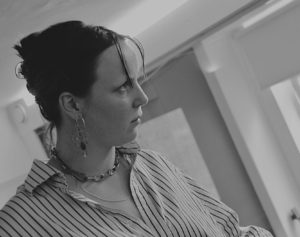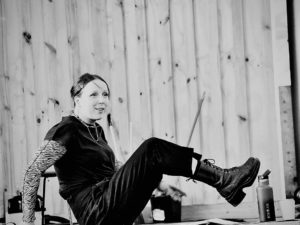Can you tell us a bit about Rainer and what it’s about?
Max: So, Rainer is about a delivery rider who rides around London each night, observing characters and lives through the doorway. She’s a kind of passionate loner/flaneur who’s fascinated with people and mythologising the city but terrified of letting anyone in. She’s also a budding writer and, as she delivers, invisible to everyone around her, she secretly documents the people and things she encounters. She also builds relationships with some of the people she delivers too and she’s naturally quite caring too. But she’s desperately lonely too and sort of drowning in her own isolation which is the conflict of the piece.But it’s also from a genuine love of London and all the characters you meet.
Where did you find inspiration for the idea?
Max: I’ve always wanted to make a ‘City Play’ or film, where the city and its residents are as important as the central character. Things like Dylan Thomas’s Under Milkwood, Goodbye to Berlin, Virginia Woolf, stuff like that. But also with this fierce but lonely, sort of wandering poet at the centre of it.
Films like Mike Leigh’s Naked and Jean Rhys’s writings. A lonely romantic who is desperate for connection, secretly but hides behind misanthropy.
I also spent a lot of my twenties, like Rainer, riding constantly around London at night between service and other jobs and you can’t help day dream and mythologise the city just from boredom.
Also, the play was inspired and written last year during the first lockdown in London, where the streets were apocalyptically empty, save for hundreds of delivery workers riding back and forth across the city.
I think it was the moment when these invisible people became more visible and ‘unskilled’ or ‘service’ workers became ‘skilled’ or vital workers. The play is about that too: looking at this new class of workers and appreciating their importance.

What about you Sorcha, how did you find inspiration for the role of Rainer?
Sorcha: To be honest I don’t tend to look for inspiration in fictional characters but I… know what it’s like to work multiple jobs where you’re not treated with a lot of respect. In order to survive here. But I’ve been talking to a lot of people who have done more delivery work than I have, I’ve been spotting people on the street and other Rainers and character aspects she might have. I briefly did delivery work but, like Rainer, I’ve worked just so many jobs where you’re treated like shit and minimum wage and obviously so many more people are working under more stressful conditions but I know what it’s like to feel like you’re floundering a lot in London and now I’m re-visiting that headspace.I also read a lot of Jean Rhys for this, who is Rainer’s favourite writer. And I know exactly why she’d connect to this writer. Jean Rhys was such a unique figure in the literary world and was surrounded, or lived in a time and place with all these famous artists and writers but was just a constant outsider. Someone who struggled with her mental health and worked a million different jobs and was in Paris in the 1920s with all these literary greats but never bumped into them cos she was too busy being in grotty hotels and getting up to not very happy things.
So, what happened next – how did you get the play produced?
Max: So, the Arcola have built this new outside space that is very Covid-friendly and they’re having a festival in it celebrating new work and visions of the future so I was in contact with them about having a piece in it for a week. The outside space is great and I think definitely the way forward!
Can you tell us about the collaborative process from writing the script to getting ready for performance?
Max: So, I asked our director, Nico Pimpare, who is also working on a short film version of Rainer, to direct this as he knew the short film so well. We’re both into the same slightly surreal tales and of course he knew the character and the landscape of the piece so well so it’s been a lovely and very smooth process. Also, Sorcha, who plays Rainer: we’ve worked together before on a different play and she’s a joy to work with.
Max: And she really gelled with this text and fitted the character so well. So all in all, it’s been great.
Sounds like it all worked out! So, Sorcha, how do you feel playing the character of Rainer?
 Sorcha: Um. She feels… it’s that point in the process where she feels very layered with my own thinking now. I feel like I’m walking around London- I feel I’m pounding around London like her, seeing the world like her; seeing the joy, the little scenes playing out in the world and finding joy and sadness and curiosity in them in a way that I think I handed done before.
Sorcha: Um. She feels… it’s that point in the process where she feels very layered with my own thinking now. I feel like I’m walking around London- I feel I’m pounding around London like her, seeing the world like her; seeing the joy, the little scenes playing out in the world and finding joy and sadness and curiosity in them in a way that I think I handed done before.
How has the rehearsal process been?
Max, a couple of playwriting questions! Did you face any particular challenges when writing the script? How did you overcome them?
Yes, definitely. The problem with a play or film with tons of side characters and vignettes, especially within a one-woman show like this, is that you want to have loads of them but each scene has to contribute to the narrative or its redundant really. But I still loved writing it, just structurally it could be a bit tricky sometimes.
Max: I’ve learnt about the full-length monologue far more and how it’s a brilliant medium for having all these side characters and vignettes.
And before we go, what would you tell audiences coming to see the play and what to expect?
 Sorcha: Big ole slap in the face. No. I think… and I hope. Really truly in a very simple way. That our audiences get on the tube on the way home. Or walk routes that they’ve always known and just noticed something different, something different that they haven’t noticed before. Notice people they don’t look at, or acknowledge or think about the inner-lives of these people. I think that’s what I hope for. And what I’ve done in preparation for Rainer. And I think you can’t help but do that. Cos I think if you have that moment of realising that everyone, even invisible delivery people, have that inner-life and hopes and dreams and desires just like everyone else on this planet, I think that’s where empathy will grow.
Sorcha: Big ole slap in the face. No. I think… and I hope. Really truly in a very simple way. That our audiences get on the tube on the way home. Or walk routes that they’ve always known and just noticed something different, something different that they haven’t noticed before. Notice people they don’t look at, or acknowledge or think about the inner-lives of these people. I think that’s what I hope for. And what I’ve done in preparation for Rainer. And I think you can’t help but do that. Cos I think if you have that moment of realising that everyone, even invisible delivery people, have that inner-life and hopes and dreams and desires just like everyone else on this planet, I think that’s where empathy will grow.
Finally, what is the future for Rainer?

